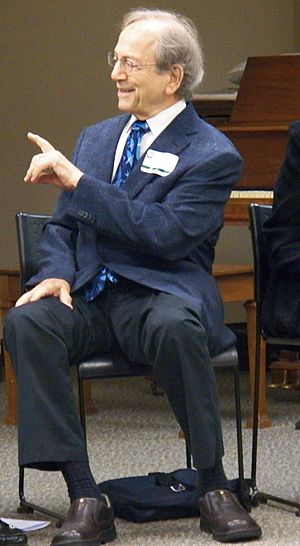Donald N. Levine facts for kids
Quick facts for kids
Donald N. Levine
|
|
|---|---|

Levine in 2013
|
|
| Born | Donald Nathan Levine June 16, 1931 New Castle, Pennsylvania, U.S. |
| Died | April 4, 2015 (aged 83) |
| Occupation | Sociologist, educator, social theorist, Ethiopianist |
| Nationality | American |
| Alma mater | University of Chicago |
| Notable works | Georg Simmel on Individuality and Social Forms (1972), Greater Ethiopia (1974), The Flight From Ambiguity (1985), Visions of the Sociological Tradition (1995) |
Donald Nathan Levine (June 16, 1931 – April 4, 2015) was an American sociologist, a teacher, and a writer. A sociologist studies how people live together in groups. He was also a social theorist, meaning he developed ideas about society.
Levine was a very important person in the field of Ethiopian Studies. This is the study of the country of Ethiopia and its culture. In sociology, he is famous for his work on sociological theory. He also translated and explained the writings of Georg Simmel, a famous thinker, which helped many people learn about Simmel's ideas.
Contents
About Donald Levine
Donald Levine was born in New Castle, Pennsylvania in 1931. He went to the University of Chicago for his college degrees. He earned his bachelor's degree in 1950, his master's in 1954, and his PhD in 1957. His time at the University of Chicago greatly shaped his thinking.
After getting his PhD, Levine spent three years in Ethiopia. He taught classes at the University College of Addis Ababa there. In 1962, he joined the teaching staff at the University of Chicago. He helped start a program focused on African civilization. He became a professor of Sociology and later the dean of the undergraduate college. Donald Levine passed away on April 4, 2015.
Levine's Work and Contributions
Throughout his career, Donald Levine focused on four main areas. These were teaching college students, developing sociological theory, studying Ethiopia, and practicing aikido.
Teaching and Education
Levine made many important contributions to teaching at the University of Chicago. He helped create and improve many courses for students. For example, he reorganized a year-long course called "Self, Culture & Society."
He also started new programs, like the African Civilization studies. As the Dean of the College in the 1980s, he helped improve the college's courses. He made sure students had more chances to do research. He also strengthened programs for writing and learning foreign languages. Levine even created his own unique courses. He wrote a book in 2005 called Powers of the Mind, which talked about Chicago's special way of teaching. He won awards for his excellent teaching in 1971 and 1996.
Sociological Theory
Levine wrote many papers and books about social theory. He was especially known for explaining the ideas of famous sociologists. These included Auguste Comte, Émile Durkheim, Max Weber, and especially Georg Simmel. Many people say he helped bring new interest to Simmel's writings.
His book, Georg Simmel on Individuality and Social Forms, is a very important collection of Simmel's ideas. For many years, he taught first-year students about classical sociological theory. He was also chosen to lead the Theory Section of the American Sociological Association in 1997. For two decades, he edited a series of books on sociology for the University of Chicago Press.
Ethiopian Studies
For fifty years, Levine was very active in studying Ethiopia. He wrote two important books and many papers about the country. In 1978, he organized a big international meeting about Ethiopian Studies at the University of Chicago.
Because of his knowledge about Ethiopia, he advised groups like the U.S. Department of State. In 2004, he received an honorary doctorate degree from Addis Ababa University in Ethiopia. They praised his book Wax and Gold for helping people understand Ethiopian culture. They also noted his book Greater Ethiopia for showing how different groups in Ethiopia are connected.
Aikido and Conflict Resolution
In 1979, Levine started practicing aikido, a Japanese martial art. He continued to practice it for the rest of his life. In 2003, he earned a high rank in aikido, called yondan. He also led the University of Chicago Aikido Club for many years.
In 1986, he began teaching a special course called "Conflict Theory and Aikido." This course helped students learn how to understand and manage disagreements. It combined reading about conflict with practicing aikido's techniques for calming aggression. He also helped start Aiki Extensions Inc., a group that supports using aikido ideas in everyday life. In 2011, he put together his writings about aikido in a book called Aiki Waza Michi Shirube.
Selected Publications
- Greater Ethiopia: The Evolution of a Multiethnic Society, revised edition. Chicago: University of Chicago Press, 2000.
- The Dialogical Turn. Essays in Honors of Donald N. Levine. ed. C. Camic and Hans Joas. Rowman & Littlefield, 2004.
- The Continuing Challenge of Weber's Theory of Rational Action, Economy and Society at 2000. Stanford University Press, 2005.
- Powers of the Mind: The Reinvention of Liberal Learning in America. Chicago: University of Chicago Press, 2006.
- The View of Life, by Georg Simmel. Translation of Lebensanschauung. Chicago: University of Chicago Press, 2010.
- Social Theory as a Vocation: Genres of Theory Work in Sociology. New Brunswick, NJ: Transaction Publishers, 2014.
- Interpreting Ethiopia: Observations of Five Decades. Los Angeles, CA: Tsehai Publishers, 2014.
- "Dialogical Social Theory." ed. Howard G. Schneiderman. New York: Routledge, 2018.
 | Janet Taylor Pickett |
 | Synthia Saint James |
 | Howardena Pindell |
 | Faith Ringgold |

